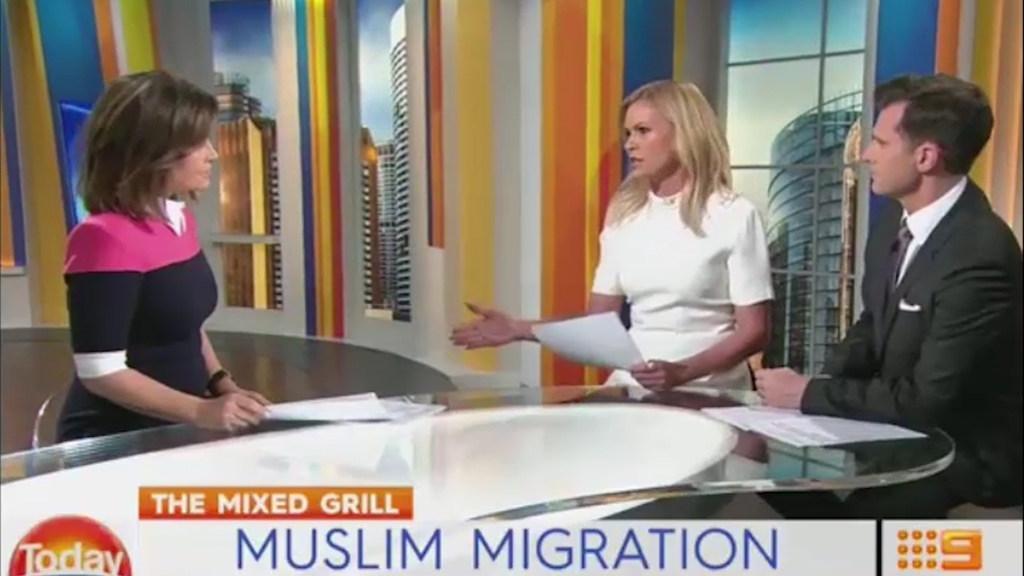You said that, you may have meant this: we’ll decide

It should be obvious to any government official in a liberal democracy that political speech should be practically immune from state regulation.
So it is troubling that a complaint against television presenter Sonia Kruger for a statement on the Nine Network’s Today that Muslim immigration should be halted is being taken seriously by the anti-discrimination division of the NSW Civil and Administrative Tribunal, and is listed for direction on June 19.
The case may well be dismissed, but NCAT deputy president Nancy Hennessy has refused an application from Nine to have the case immediately discharged, saying: “A complaint should not be summarily dismissed except in a very clear case.”
So what did Kruger utter that might be vilification?
In an exchange between co-hosts Lisa Wilkinson and an inarticulate David Campbell, Kruger said “there is a correlation between the number of people who, you know, are Muslim in a country and the number of terrorist attacks … Personally I would like to see it (Muslim immigration) stopped now for Australia. Because I want to feel safe, as all of our citizens do, when they go out to celebrate Australia Day.”
In the initial exchange and in a follow-up statement, Kruger emphasised that she did not believe all Muslims were terrorists, saying: “Now, I have a lot of very good friends who are Muslim, who are peace-loving, who are beautiful people, but there are fanatics.”
But Kruger’s repeated affirmations of the goodwill of most Muslims were to no avail. A racial vilification complaint was lodged on the grounds that she unfairly singled out Muslims and attempted to dehumanise them.
We have a serious problem when a statement regarding immigration policy, that explicitly rejects the notion that all Muslims are terrorists but that calls for a halt to Muslim immigration, is considered potentially vilificatory.
Surely immigration policy is of central importance for any nation, and the character of immigrants and the ethnic communities that will emerge also must be of central concern. This is especially the case given the problem of global terrorism, not to mention the integration problems faced by countries with large Muslim minorities such as France, Belgium, Germany, Britain and, increasingly, Sweden.
Part of the problem is the confusion between religion, culture and race that has come to characterise much debate on free speech and the question of Islam in liberal democracies. Conflating religion, culture and race makes it impossible to criticise religions and cultures without being called a racist, and nobody wants to be known as a racist. Kruger is a case in point.
Under the NSW Anti-Discrimination Act, which she is accused of having breached, it is unlawful “to incite hatred towards, serious contempt for, or severe ridicule of, a person or group of persons on the ground of the race of the person or members of the group.” Channel 9 pointed out the obvious. Kruger has said nothing about race and therefore could not have breached the act.
But NCAT still deems Kruger’s comments potentially racially vilificatory and will not summarily dismiss the complaint.
The effects of confused thinking about race, religion and culture are serious indeed for liberal democracy.
The usual leftist argument against distinguishing between race and religion is that religion is really a surrogate for race: people who criticise Islam really just don’t like Muslims. So, while Kruger claims she’s talking about a religious category, she’s just dog-whistling to anti-Muslims.
But, again, strictly speaking would not be clearly racist either; a Muslim can be of any race, so the identity marker picked out in anti-Muslim speech or sentiment is not racial.
This is proven by the fact some of the most vocal critics of Islamic immigration in Australia are Egyptian and Lebanese Christians; they don’t criticise Islamic immigration because they dislike Arabs.
Just for the record, anyone who suggests after seeing the Today segment that Kruger was dog-whistling is confused or mischievous. But as with a dog whistle, whose silence is really piercing noise, the dog whistle analysis of political speech requires that what is literally said is not what is really said.
But is it wise to grant state-backed human rights commissions and anti-discrimination tribunals the power to declare what someone really means, despite what they said? Isn’t it especially unwise to grant such powers when it comes to political speech? Do we want the state telling citizens what they really meant by their utterances on immigration, Islam, and Muslims, then punishing them for it?
The confusion between religion and race brought to life by cases such as Kruger’s is chilling indeed.
Steve Chavura teaches politics and history at Macquarie University, Campion College and the Lachlan Macquarie Internship.





